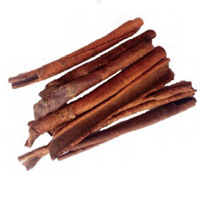Bio efficacy of Cinnamaldehyde from Cinnamomum verum essential oil against Culex quinquefasciatus (Diptera: Culicidae)

Accepted: 27 January 2021
HTML: 218
All claims expressed in this article are solely those of the authors and do not necessarily represent those of their affiliated organizations, or those of the publisher, the editors and the reviewers. Any product that may be evaluated in this article or claim that may be made by its manufacturer is not guaranteed or endorsed by the publisher.
Authors
This research aims to study the efficacy of Cinnamomum verum (Cv) extracts for ovicidal, larvicidal, and repellent activities against Culex quinquefasciatus mosquito vectors. The active components of C. verum or cinnamon oil by Gas Chromatography (GC) analysis showed the highest cinnamaldehyde at 83.53%. For ovicidal assay, C. verum essential oil at concentrations 12.5, 25 and 50 ppm at 72 h had 100% egg hatch inhibition and had a significant difference when compared to the control group (p<0.05). Larvicidal activity showed that concentrations of 25 and 50 ppm were highly effective in killing 100% mosquito larvae. Morphological changes in egg raft showed a faded color and eggs that seemed to have split from their raft while the larvae changed to a pale white wrinkled body with a destroyed inner tube of the body and were motionless. A Scanning electron microscope study showed that the eggshell and micropyle were wrinkled with the chitin peeled out. After treatment with cinnamon oil, larvae appeared to have a wrinkled body, the thorax and abdominal cuticle were also destroyed with high density of oil particles observed on mouth brushes and obstructing the spiracle. The repellent assay showed that cinnamon oil could repel both male and female mosquitos for up to 180 min. From the results, it was concluded that cinnamon oil had highly effective repellency against Culex quinquefasciatus adults and insecticidal activity on eggs and larvae stages evidenced by LC50 at 6.59±0.54, 9.07±0.67 and 36.91±7.56 ppm and its morphological changes indicated how the mosquito could not survive after cinnamon oil treatment hence this may be a useful alternative method that is green friendly for controlling mosquitoes in endemic areas.
Supporting Agencies
National research and innovation (Non-flagship) 2563How to Cite
PAGEPress has chosen to apply the Creative Commons Attribution NonCommercial 4.0 International License (CC BY-NC 4.0) to all manuscripts to be published.

 https://doi.org/10.4081/jear.2021.9400
https://doi.org/10.4081/jear.2021.9400



